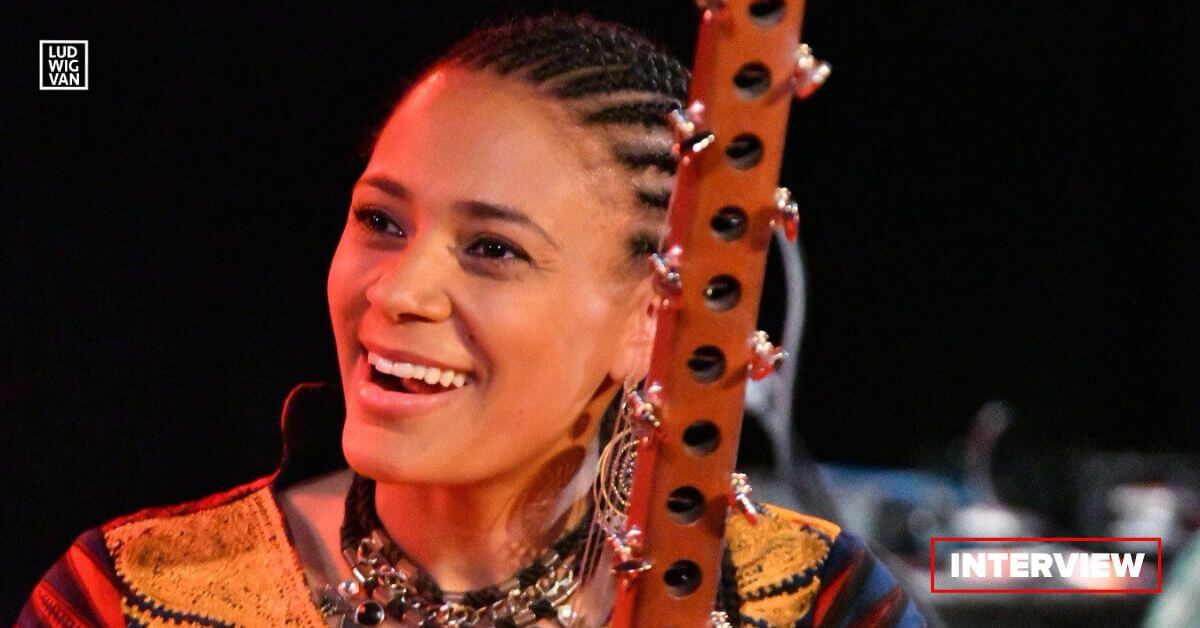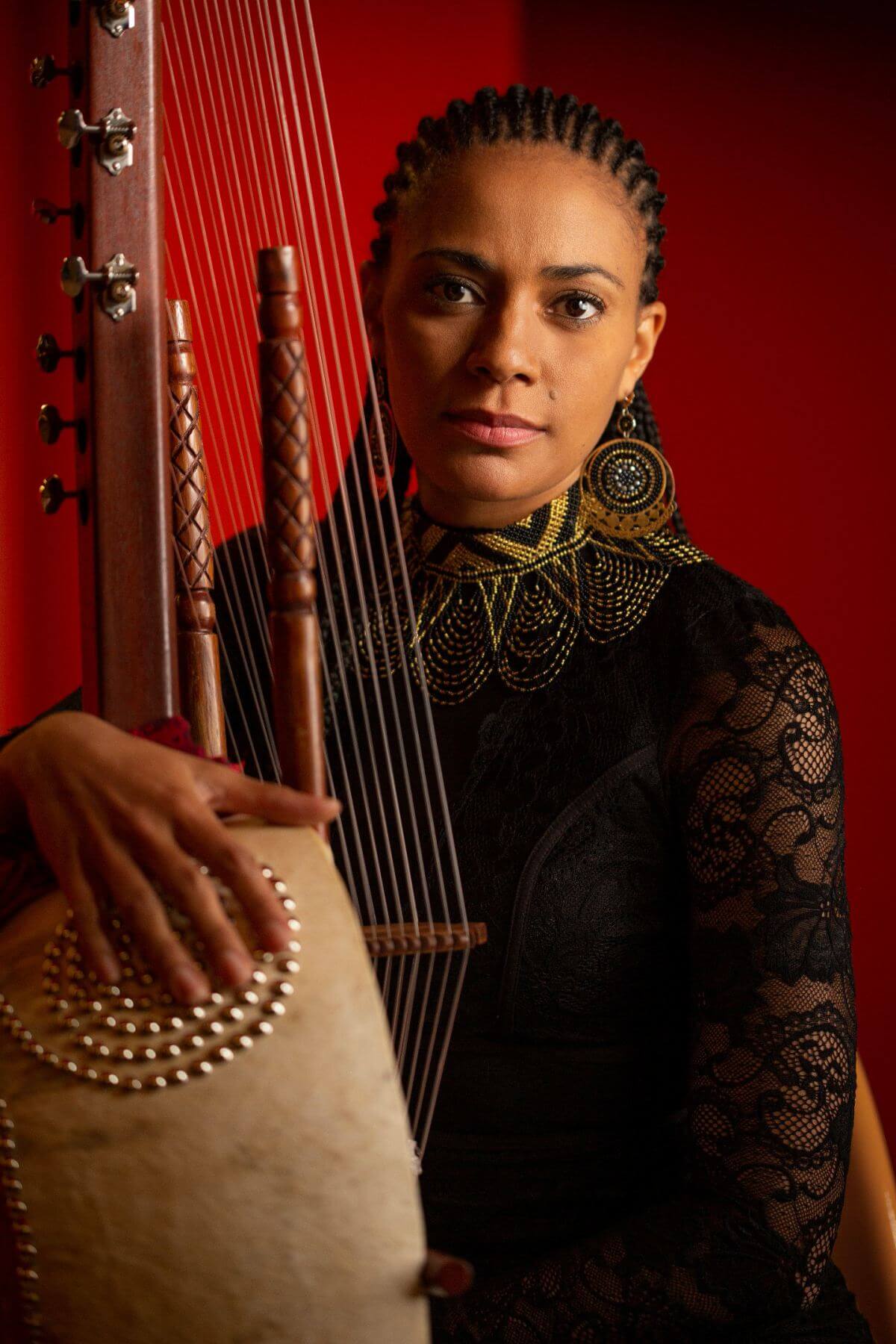
The term classical music, in Western society, has become a broad term that goes beyond the music of what we call the classical era to encompass all art music that stems from tradition. In The Gambia, there is likewise a musical tradition that stretches back centuries and infuses the music of today.
Kora virtuoso Sona Jobarteh takes the music and traditions of The Gambia’s past and brings them into the future.
The West African Griot & The Kora
A griot is a musician, part of a centuries old tradition of the Mandingo peoples of West Africa. The griot is an inherited role that involves music, and much more. Each griot family specializes in a particular instrument. The Jobarteh family is one of five families who are designated by time honoured practices to play the kora, a 21-string bridge harp.
Sona’s grandfather Amadu Bansang Jobarteh was a designated griot. More than providing music as entertainment, the role of the griot was to remember everyone’s family history within a village or town, and preserve the oral traditions in musical form.
Her cousin is internationally acclaimed kora player Toumani Diabaté.
“It’s a tradition that goes back seven hundred years,” she notes.
While it may begin with tradition, however, Sona’s music practice by itself breaks with the past. The kora and the role of a griot is traditionally all male, and Sona is the first woman practitioner in her family. “I’ve gained that recognition,” she says.

She describes her music practice as finding her way to connect traditions to the current and modern day “It’s very much the same as Western music,” she notes. “It’s really not that much different.”
Sona learned to play the kora from the age of three, taught first by brother Tunde Jegede, and then by her father Sanjally Jobarteh.
She also studied cello, piano and harpsichord at the Royal College of Music in London, where she was born. Sona went on to study composition at the Purcell School of Music, and completed degree studies at the University of London.
As a student, she worked on orchestral projects with the Irish Camber Orchestra, and performed with the Britten Sinfonia, and Royal Philharmonic Orchestra, among others. Along with her own music, she is also a member of brother Tunde Jegede’s African Classical Music Ensemble, which has toured internationally.
Sona has also composed music for film, often using the traditional West African idioms and instrumentation in innovative tunings and techniques.
The fact that music is still an integral part of West African society is a legacy of that past. “It still has very much an innate connection to society,” she says. In Gambia, though, as in the rest of the world, the old traditions are giving way, and modern music is moving towards the global model of entertainment for its own sake.
When it comes to her compositions, while her technical skills are in evidence, she’s drawn more to the emotional underpinnings of the music. “It always has been drawn from the same place for me,” she says of her inspirations, “emotions rather than technicalities. I always find ways to express certain emotions in sound.”
That approach also applies to her film music. The music, which doesn’t conveniently fit into the classifications of the commercial industry, is often programmed as jazz or blues. In context, it’s more properly a kind of crossover.
A Modern Griot
Ironically, even as her music looks to establish its place in the modern world, she’s also fusing social responsibility with her role as a musician – an element of the past that is becoming lost in the globalization of modern societies. Sona’s latest work release, 2022’s Badinyaa Kumoo, is part of that. Its themes include the empowerment of women and children, as well as artists, as a way forwards towards positive change.
“In many ways, I was seeking to close the gap between my music and the work that I do in education and social development in Gambia and the continent at large.”
Several years ago, Jobarteh established The Gambia Academy, a school designed to teach the younger generation about their culture, history, and traditions alongside the usual academics. She sees education as a crucial tool in ensuring a brighter future for The Gambia, and modifying the post-colonial value system and approach is a big part of that initiative.
“It’s rooted in education at the core,” she says. Education, as she explains, is the essential starting point of sustainable development.
“That’s what I’m really dedicated to,” she adds, “more than music. Music has historically been a vehicle for communication and change.” It’s meant to take an active role in society, and not serve merely as a distraction. “In recent society, I propose that this has slowly and consistently been devalued,” she says. “Musicians are in a vacuum.”
The fact is that musicians have an influence over their fans. “Whether they like it or not they do, because music is incredibly powerful.” She’s asking them to be cautious and cognizant of the role they already do play in society.
The Concert
Sona will be making her Koerner Hall debut on March 9, and her return to the city after several years.
“It’ll be great to be back in Toronto,” she says.
On stage, she’ll sing and play acoustic guitar as well as the kora. She will be joined by her band: Eric Appapoulay, guitars & vocals; son Sidiki Jobarteh, balafon; Andi McLean, electric bass; Yuval Wetzler, drums.
“I hope it won’t be cold.”
While the March 9 concert is currently sold out, a limited number of rush tickets are made available about three hours before the show, and are only available by phone via RCM Tickets at 416.408.0208.
After Toronto, her tour continues to Ottawa on March 10, and then south through the US.
Are you looking to promote an event? Have a news tip? Need to know the best events happening this weekend? Send us a note.
#LUDWIGVAN
Get the daily arts news straight to your inbox.
Sign up for the Ludwig Van Toronto e-Blast! — local classical music and opera news straight to your inbox HERE.
- INTERVIEW | Composer Ari Kinarthy And Director Jeff Lee Petry Talk About Ari’s Theme, Premiering At Hot Docs - April 26, 2024
- PREVIEW | Creators & Performers Natalya Gennadi And Kristine Dandavino Talk About Grandma’s Shawl - April 26, 2024
- PREVIEW | Artistic Director Emily Cheung Dives Into Little Pear Garden Dance Company’s History & 30th Anniversary Peformance - April 26, 2024



